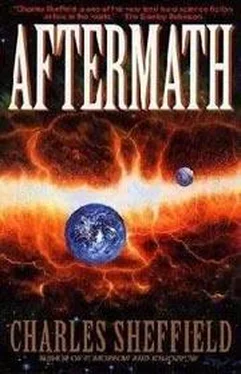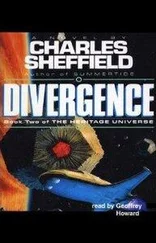“No. Far from it.” Again, Art felt a reluctance to give details to Seth.
“Well, if you had you’d be able to take a good shot at answerin’ your own question. Maybe you can anyway.”
Art said nothing.
Seth was over by a window, staring out at snow that fell as heavily as ever. After a moment he went on, “I’m in the shipping business — or I guess I should say I used to be. ’Til eleven days ago Supernova Alpha was givin’ us wild weather, but nothin’ that the system couldn’t handle. Shipments from South America and South Africa were spotty an’ gettin’ worse, but the freight monorails were bringing supplies in regular from anywhere on this continent. Some folk were even sayin’ it was no bad thing if food stockpiles were comin’ down. The recom ag protocols can grow strawberries on a salt heap, so they say, and we’ve had gluts an’ more and more long-term storage for the past decade. Be nice to pull ’em down a bit.
“Then, twelve days ago, March 14, Day of Infamy ’cept we had nobody to blame an’ flame, Nature stopped playing around an’ crapped all over us.
“When the gamma burst hit an’ all the microchips went belly-up” — it was Art’s first confirmation that what he had told Ed O’Donnell and Joe Vanetti was correct — “I knew we were in trouble, but I don’t think anybody had any idea how much. I sure didn’t. I mean, power went out, but we’ve had outages before. The Antifed blowout in ’16 shut the whole damn grid down for eight days, how could anything be worse than that? Next day, though, I couldn’t get a telcom working, or a van, or a credit machine. There were a dozen big holes around the city, where heavy lifters just dropped out of the sky. Nobody knew what the government was doing — if it still existed. I chose my place, stockpiled all I could, and went to ground. I might be there still, if Dana hadn’t called. Though I have to say, I was gettin’ awful itchy to find out what was happenin’ at the Institute.” Seth pulled back his sleeve to reveal three spots of light blue. “There’s the reminder, my treatment session comin’ up in six weeks — not that I need reminding, any more than you do. That’s why we’re here. It’s why we’re even alive, when logically we ought to be dead. Lazarus Club members might not like each other much” — Seth winked at Art, as though he knew more than he was saying — “but we can rely on each other for one thing: a strong interest in living.
“But what about the rest of the people? I don’t mean the whole continent. I don’t give a damn about that. I mean this city and the area around it. There’s fifty million people here — no, forget that. Let’s say, twelve days ago there were fifty million. It’s been twelve days now without power. Twelve days since water came out of the faucets, twelve days since food supplies came in from outside, twelve days since a news broadcast system existed, twelve days since money or government could do anything for you.”
“It takes longer than twelve days—” Dana began. But she stopped, and turned her head back down to the little stove.
“Longer than that, for people to die of starvation?” Seth walked to where Art had snagged a few grains of rice with his knife and was tasting them to see if they were cooked. “Yeah. It does. But it only took three or four days for some people to figure out that no one had any idea how long the problem would go on — we still have no idea, least, I don’t. An’ I live — lived — half a mile from the White House. Wouldn’t you think it ought to be safe there, if anywhere could be? But by the sixth day I decided to get out. Too many corpses for my taste. An’ I could hear gunfire around the clock. Most guns have smart circuits for automatic aiming and target motion compensation, so they won’t work anymore. My guess was, for every shot I heard there must have been fifty people stickin’ each other with knives or bangin’ away with clubs and axes.”
“So how did you get out of there?” Dana asked. “I mean, if it was so dangerous.”
Seth grinned at her. “I’m not always the high-class gent you see today. I had to do a little slice-and-dice of my own before I was out of the city. No big deal, nothin’ to get excited about. But I managed. That rice cooked yet?”
Art nodded to Dana. She began loading it onto flat pieces of hardboard made by breaking a ruined painting into three parts. The kitchens had been emptied of all the plates, and the hardboard fragments were her best approximation. The original picture had showed a group of pirates burying treasure. Art, turning his piece over before Dana loaded it, found he was looking at a bearded bare-chested man, a sandy strip of beach, and the prow and foredeck of a sailing ship in the background.
“So what’s your answer?” he asked. “Where are the people?”
Seth took a load of rice and went back to the window. “What do you think, maestro? I already said my piece.”
“I’ve not been close to things, the way you have, but nothing you’ve said surprises me. A lot of people are dead, maybe thousands, and everyone else is going to lie low until the government gets hold of things again, or folks become so starved and desperate that they think they have nothing to lose.”
“Not far off.” Seth was eating rapidly, with no sign of reduced appetite at the thought of heaps of corpses within twenty miles. “But you’re too optimistic. I’d say you got a few thousand dead where there’s big food warehouses and the pressures are less. In the inner cities, though, it’s more than that by now. And the starvation and disease are just startin’, not to mention rats and flies and “polluted water and no food. Things are going to get a lot worse before they get better.”
Art glanced across at Dana, wondering how all this talk of death was affecting her. She was nodding thoughtfully and eating as heartily as Seth. When it came to the crunch, she in her own way was as tough as anybody.
“From what I saw coming over here,” she said, “you might both be optimistic. I must say, I didn’t waste time stopping to look — the first sign of trouble, I was up to seventy miles an hour and long gone — but I saw plenty of dead bodies. And I passed through whole subsections in the suburbs where the smell was just awful. I only saw one cleanup group, and they were pulling a wheeled trailer by hand.”
“Not today, though.” Seth laid his emptied makeshift plate on the broad windowsill. “This snow is the best thing that could have happened to us. Nobody’11 be outside who doesn’t have to be. How long ’til you’re ready to leave? We don’t know how long it’s goin’ to stay this way, might as well take advantage.”
“Two minutes.” Art swallowed a final mouthful of rice, washed it down with coffee, and followed Dana out of the dining room.
“I don’t know how you felt,” he said softly, when Seth was safely out of hearing, “but I think he may have more to do with the number of dead bodies back in the city than he wants to admit.”
She turned to him and dropped her voice. “I’d bet on it. There’s something I ought to have told you last night, but I didn’t because we’ve never talked about other group members before. Did you know that Seth was once put on trial for murder?”
“He told you that?”
“No, and I never asked him. When I first met him I remembered reading about it. He was accused of blowing up three of his partners on a boat off Cape May. They were planning to push him out of their business.”
“He was acquitted; he must have been.”
“Right. Good lawyer, tainted evidence. But that doesn’t mean he was innocent.”
“I’m sure he wasn’t. You heard that ’a little slice-and-dice.’ Did you see the gun in his belt when he stood up and his coat was open? I’ve never seen him wearing clothes before that looked anything like that — and his coat’s too big for him.”
Читать дальше












